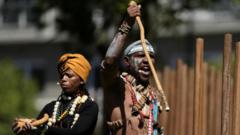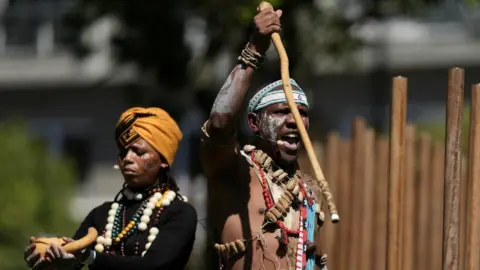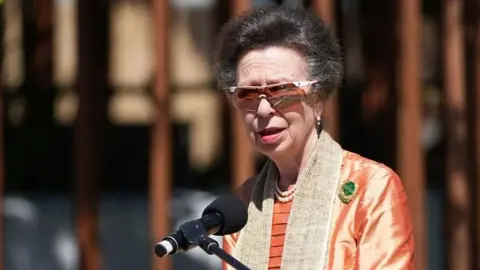This website uses cookies so that we can provide you with the best user experience possible. Cookie information is stored in your browser and performs functions such as recognising you when you return to our website and helping our team to understand which sections of the website you find most interesting and useful.

BBC News, Johannesburg & London
 Reuters
ReutersHundreds of South African servicemen, mostly black, who died during World War One have been honoured with a new memorial in Cape Town after going unrecognised for more than a century.
The 1,772 men worked in dangerous and gruelling non-combatant roles in East Africa but until now, they had no known grave or commemoration.
Individually engraved timber posts now bear each serviceman's name at the new memorial.
Princess Anne, president of the Commonwealth War Graves Commission (CWGC), unveiled the memorial at a moving ceremony attended by relatives of the dead.
In 2021, the UK apologised after a report blamed "pervasive racism" for the failure to properly honour at least 100,000 black and Asian troops who died fighting on its side.
Relatives said they were "proud" and "happy" to see the contributions of the servicemen being finally recognised at the Cape Town Labour Corps Memorial.
The men worked as porters, wagon drivers and on the railways.
One of those honoured was Bhesengile Delihlazo, a driver who died on 21 January 1917.
His great-nephew Elliot Malunga Delihlazo said the family was happy to finally discover when Delihlazo died, even though the question of exactly where remained unanswered.
And while the serviceman has already been privately honoured with a memorial stone at the Delihlazo homestead, his relative said: "It makes us proud really, that at last, we can be one of the families that people can talk about in the due course of history".
 PA
PAJob Hlakula's great-grandson said they were "humbled" by his inclusion in the memorial.
"We are very proud of him. We even rejoice when we talk about Job, it's a pride that we've got in our name, for him to be remembered," said Zweletu Hlakula.
The CWGC, tasked with commemorating those who died in the two world wars, said the memorial was a "culmination of years of work".
"It acts as a poignant tribute to the predominantly black South Africans who fought in Africa during the First World War and who were not commemorated at the time," said the commission's director general Claire Horton.
You may also be interested in:
 Getty Images/BBC
Getty Images/BBC


 Africana55 Radio
Africana55 Radio 

